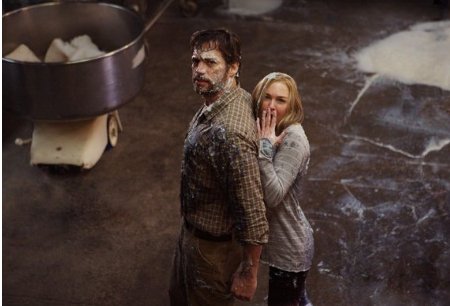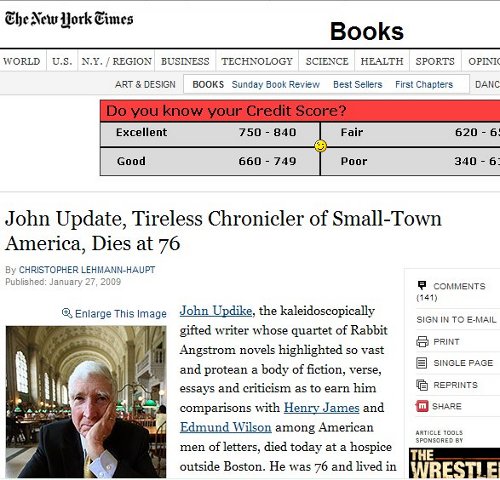
I am not necessarily opposed to romantic comedies. In fact, I even confessed to my moviegoing companion on the subway ride back that I enjoyed Notting Hill. I’m pretty certain that, given the choice between rewatching a Lucio Fulci film or Notting Hill, I would opt for the former. But the truth is the truth. Notting Hill more or less works and has some good dialogue, even if Julia Roberts plays Julia Roberts and the narrative is more obvious than the need to apply suntan lotion in 120 degree weather.
Richard Curtis would go on to make one of the most unpardonably atrocious films of all time. New in Town thankfully isn’t as bad as Love Actually. But that’s hardly a consolation, for it isn’t nearly as good as Notting Hill, and Notting Hill isn’t nearly as good as at least a hundred wonderful romantic comedies. By the time you get to New in Town‘s schmaltzy tapioca spraying scene (which reminded me of Zoolander‘s satirical gasoline montage), you know that any sliver of faith you’ve placed in the film can’t possibly be redeemed.
You see, New in Town is a romantic comedy that has a modicum of charm and better acting than a derivative movie of this type has any right to possess. Here is a movie that has pilfered elements from other rom-coms: the corporate crusader vs. the working man advocate at the heart of You’ve Got Mail, the city slicker humbled by the charms of small town life from Doc Hollywood (complete with a David Odgen Stiers-like character played by J.K. Simmons), and the romantic protagonist as a business exec who busts up companies in Pretty Woman (Renee Zellweger has replaced Richard Gere). It’s a movie so quaint and anachronistic that it even has the opening credits at the beginning. The way they used to. The way that audiences conditioned themselves to accept condescending junk without question.
I felt a strange emotional conflict sitting through this movie. I was appalled by the Minnesotan stereotypes, the obvious music cues (“Walking on Sunshine” when Zellweger attempts to escape to Miami), the reliance upon coincidence (a snowstorm), the pat happy ending, the union rep who doesn’t object to unpaid overtime, and the terrible Jesus jokes (redeemed by a better populist joke about belief later in the movie). I wanted the people of New Ulm, Minnesota to hail their conquering hero or make more intriguing efforts to welcome the woman who came to dinner. If only the filmmakers could understand that small towns are laden with life and a lot of fun, that the people who live there aren’t caricatures, that having a good ear for regional dialogue is a must, and that this movie’s potential audience would have augmented tenfold if the New Ulmites hadn’t been treated like one-dimensional rubes. Unfortunately, screenwriters Ken Rance and C. Jay Cox seem to think that phony parochialisms like “Ain’t that a kick in the keister,” “Oh for crying in the bean cheese soup,” and “We don’t give a goose fart on a muggy day” represent verisimilitude. It’s abundantly clear that these two Hollywood hacks whipped this shit up in a room and genuinely thought they were being clever. If only they were real writers who headed to Minnesota on Hollywood money to get their dialogue right. There’s also the token guy living in his ex-wife’s basement, the unbelievable idea of a woman as capable as Zellweger’s character not heading to Minnesota without winter wear, and a ruthless company not cutting Zellweger loose after she’s defied orders for tapioca pursuits and tapioca storytelling.
But just as I was about to give up, something slightly interesting would happen. Frances Conroy would evade bad direction to speak like the Fargo people by speeding up her line delivery, and it was a marvel to watch her improvise under the circumstances and bring something to lackluster material. A New Ulm resident would momentarily evade the stereotypical trappings with a small irony on how only city slicker idiots froze to death while walking down the highway in subzero temperatures. The camera would linger on Zellweger’s hair for more than a minute as she was emerging from a hangover. (No, you’re not exactly going to get Eric Rohmer takes in a movie like this, but, really, how often do you see a long take like that in a mainstream comedy?)
Such moments were too few. When Harry Connick Jr. told Zellweger, “You know you’re not so bad when you’re unconscious,” I had the strange feeling that he was talking directly to me. Maybe he might take me home and try to molest me. Perhaps he might show me his package. (Does he have a decent package at 42? I certainly hope so.) Or maybe he wanted me to be unconscious so that I might forgive the movie a little more. Maybe if I “wouldn’t be so bad,” I might wake up in a snug bed and pretend to watch wrestling on TV after we lip locked. Because that’s what Minnesotans do apparently: watch and elect wrestlers. Maybe I could take Connick’s daughter to the big city for shoes and I could walk around airports in high heels to show that I was just as assertive as Zellweger. This was, after all, what womanhood was to director Jonas Elmer. For all I knew, this definition extended to manhood. Walking around in high heels and having a man like Connick unzip a suit while I was trying to pee. Romantic escapades like that.
You get the picture. I honestly didn’t hate this movie as much as I probably should have. But I didn’t like it all that much either. Ain’t that a kick in the keister?


